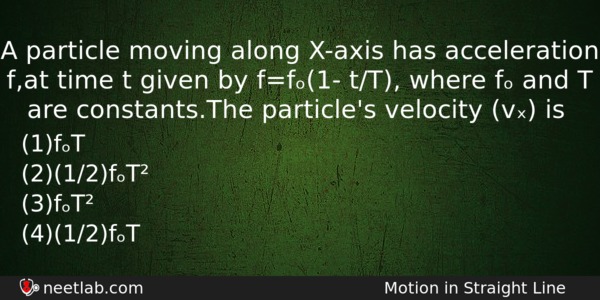| ⇦ | 
| ⇨ |
A particle moving along X-axis has acceleration f,at time t given by f=fₒ(1- t/T), where fₒ and T are constants. The particle’s velocity (vₓ) is
Options
(a) fₒT
(b) (1/2)fₒT²
(c) fₒT²
(d) (1/2)fₒT
Correct Answer:
(1/2)fₒT
Explanation:
Acceleration, f = dv/dt = f₀[1-(t/T)]
dv = f₀[1-(t/T)]dt —–(i)
On integrating Equation (i) both sides, we get
.·. v = f₀t – (f₀/T)(t²/2)dt + C —–(ii)
After applying boundery conditions v = 0 at t = 0, we get
Therefore, C = 0
v = f₀t – (f₀/T)(t²/2)dt —–(iii)
As, f = f₀[1-(t/T)]
When, f = 0,t = T
Substituting, t = T in Equation (iii), then velocity
vₓ = f₀T – (f₀/T)(T²/2)
= f₀T – (1/2)f₀T = (1/2)fₒT
Related Questions: - The angular velocity of second’s hand of a watch is
- Copper and carbon wires are connected in series and the combined resistor is kept
- At what height h above earth, the value of g becomes g/2 (where R=radius of earth)?
- A nucleus at rest splits into two nuclear parts having radii in the ratio 1:2.
- The manifestation of band structure in solids is due to
Topics: Motion in Straight Line
(93)
Subject: Physics
(2479)
Important MCQs Based on Medical Entrance Examinations To Improve Your NEET Score
- The angular velocity of second’s hand of a watch is
- Copper and carbon wires are connected in series and the combined resistor is kept
- At what height h above earth, the value of g becomes g/2 (where R=radius of earth)?
- A nucleus at rest splits into two nuclear parts having radii in the ratio 1:2.
- The manifestation of band structure in solids is due to
Topics: Motion in Straight Line (93)
Subject: Physics (2479)
Important MCQs Based on Medical Entrance Examinations To Improve Your NEET Score
18000+ students are using NEETLab to improve their score. What about you?
Solve Previous Year MCQs, Mock Tests, Topicwise Practice Tests, Identify Weak Topics, Formula Flash cards and much more is available in NEETLab Android App to improve your NEET score.
Share this page with your friends

Leave a Reply